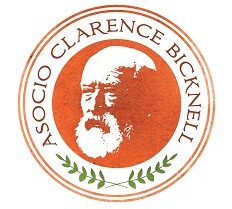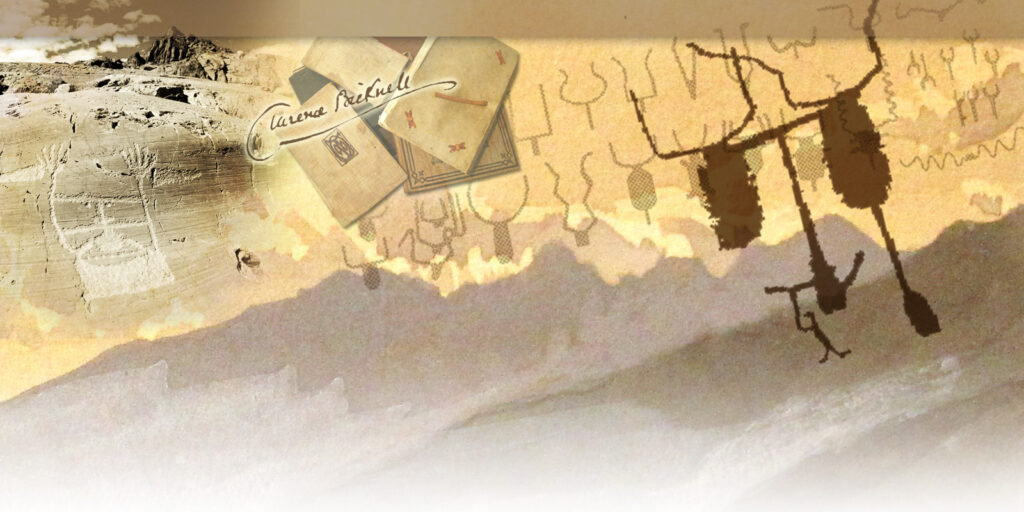POEMS
Clarence Bicknell’s principal works of poetry are in Esperanto; in fact there are no serious poems in English in the museums referred to on this site nor in the family collection. Some doggerel illuminates some of the work for children or for Margaret Berry, but they are hardly poems. Clarence’s poems in Esperanto, like his hymns, are heartfelt and well studied. The attention and prominence given to them by the Esperantists of the world suggest that they have value as examples of Esperanto as well as of poetry.
We reproduce here the most well-known of Clarence’s poems and links to other sources. New Year 1904 is profoundly pessimistic; one wonders whether Clarence was already aware of belligerent tensions mounting in Europe, or whether his was a more general despair at the way the lives of many people were going.
Marcus Bicknell, April 2013
The Emigrants
| La elmigrintoj | Translation by William Auld |
| Li ŝin forlasis plena de espero. (Ho, varme loga vento de somero!) ‘En la transmara land’ mi trovos riĉon, kaj post alveno via la feliĉon.’ Li skribis: ‘Kruda lando, penaj provoj.’ (Ho, forta treno de l’ aŭtunaj blovoj!) ‘Sed mi laboras jam, mi trafos celon, rapidu, portu al mi vian belon.’ Ŝi venis treme post danĝer’ vojaĝa. (Ho, vento vintra, frosta kaj sovaĝa!) Kaj havis ŝi revidon ĉe tombrando, feliĉon en la Nekonata Lando. | He went off, hopeful, leaving her behind (Oh, breeze of summer, bountiful and kind!) ‘Over the ocean I’ll make wealth to spare, and when you join me we’ll be happy there.’ He wrote: ‘This land is cruel, times are hard.’ (Oh, how the winds of autumn tugged and jarred!) ‘But I have work, and will be justified, come quickly, bring your beauty to my side.’ A-tremble, she endured the journey’s ravage. (Oh, winter wind so bitter and so savage!) And greeted him by standing at his grave: this was the happiness the New Land gave. |
Paul Gubbins writes:
I came across The Emigrants in an edition of the house magazine of the Esperanto-Association of Britain. Its then editor, the poet and candidate for the Nobel Prize in Literature, William Auld, published poems with translations on the back of the magazine during the 1990s. Auld was an eminent literaturist – if I can use that word – of Esperanto active since before World War II. When he published the poems by Clarence, however, he gave no note as to their origins. Auld died in 2006 and his papers deposited in the National Library of Scotland. It might be possible to trawl through these to look for enlightenment but something about needles and haystacks springs to mind.
Esperantists are as much attuned to separation as other people – in fact, probably more so. Their language community is global; friends, colleagues in the Esperanto movement, live many thousands of miles apart; meetings – at congresses and other events – are often all too brief, culminating in rushed farewells on the steps of conference halls or at airports, with promises to meet again the following year: separation is as much a part of the esperantist psyche as a sense of equality for all peoples and languages.
Clarence Bicknell’s “La elmigrintoj” (“The Emigrants”) dates from an age long before jet travel, the internet and other electronic media. Developments in communication (and, more importantly, widening access to them) have helped remove much of the finality from emigration, the knowledge that loved ones left behind might never be seen again. Certainly, the world that Bicknell knew is considerably shrunken.
What is not diminished, however, is the hope for a new life, in a new land, so poignantly expressed in the poem – hope, of course, that through centuries of emigration, and irrespective of technological advance, is not always fulfilled. The translation, with the original, was published in La Brita Esperantisto (The British Esperantist) in the May/June edition of 1998.
AUTUMN Clarence Bicknell
Mallaŭta voĉo de l’ venonta vintro
tra nia norda lando ekmurmuras;
la floroj velkas sub ĉielo griza,
hirundamikoj aliloken kuras.
La gloro de l’ somero jam finiĝis:
la fruktojn ni rikoltis kaj la grenojn;
nin kaptas iom da pensad’ malgaja,
eĉ forgesante la pasintajn benojn.
Nek de l’ printempo la mantelo verda,
nek de l’somer’ la rozokrono suna,
valora la trenaĵon fajrsimilan,
la orbrodaĵon de l’ vestar’ aŭtuna.
From Akademio Literatura de Esperanto http://www.everk.it/index.php?id=25,98,0,0,1,0
The New Year 1904 by Clarence Bicknell from The Esperantist, Vol. 1, No. 4, pg. 54
| la Jar’ Nova 1904 | Translation by Clarence Bicknell |
Ĉu la Jar’ Nova povus esti Ĉu estos ĝi de brila lumo Sen dornoj estu la rozujoj Almenaŭ ĝi deviĝos porti | A year without a sorrow A year of light, with shadow A year of many roses A year of God’s unfolding |
Adiaŭ
Adiaŭ! la venteg’ kruela
Blovadas dum la nokt’ malhela,
Sed en la frumateno
La sun’ brilante sur la teroj,
Juvelojn faros el neĝeroj;
Adiaŭ! sen ĉagreno.
Adiaŭ! el la pluvolarmoj
Naskiĝos la printempaj ĉarmoj,
Kaj, apud la rivero
Ni vidos milojn da floretoj,
Ni aŭdos kantojn de birdetoj;
Adiaŭ! kun espero.
Adiaŭ! raŭpoj kaj folioj
Ŝanĝiĝos; oraj papilioj
La rozojn karesados!
Rikolto la semadon kronos;
Premion pacienco donos;
Adiaŭ! ni amados.
The Esperanto-Monthly, London, n-ro 75, marto 1919
No translation to hand. We would be grateful to a kind Esperantist who would like to help us and our readers here.
La Maro
Ho! Maro, kion kaŝas via profundaĵo?
Ho! kiom da misteroj, kiom da sekretoj?
Al ni montriĝas nur apenaŭ la supraĵo,
Hodiaŭ kun sulkiĝoj, morgaŭ kun ridetoj.
Venteto dolĉa la spegulon bluan tuŝas,
Aŭ vipo de l’ venteg’ ŝaŭmantajn ondojn levas;
Sed pac’ eterna kaj mallumo nigra kuŝas
En mond’ senmova, kie via koro revas.
Miljaroj post miljaroj pasas kaj repasas;
Naciaj, montoj detruiĝas aŭ naskiĝas;
Sed memoraĵojn sub la ocean’ ne lasas;
Vi, vasta kaj senmorta, iam ne ŝanĝiĝas.
La pafilego-tondro sur vi laŭte sonas;
Batalas ŝipoj kaj sub ondoj malaperas;
Vi nur ruĝiĝas, kie homaj koraj dronas;
Sed pro ilia agonio ne suferas.
Por serĉi nekonitajn landojn kaj riĉaĵojn,
Sur vi la kuraĝuloj malproksimen iras;
Kaj el la tuta mond’ reportas mirindaĵojn,
Sed pro l’ eltrovoj aŭ trezoroj vi ne miras.
Vi ne kompatas, se malgaja elmigranto
Larmerojn verŝas sur la longa vojo;
Vi ne komprenas la feliĉon de amanto,
Se li revenas al fraŭlina kor’ kun ĝojo.
Ho! Maro, de la urboj, de l’ montar’ tombejo!
En vian profundaĵon ĉio fine venas;
Vi estas la silenta mondo-rifuĝejo
Kaj pri l’ homara vivo la sekretojn tenas.
La Praktiko, n-ro 5 (187), 17-a jarkolekto, majo 1953

